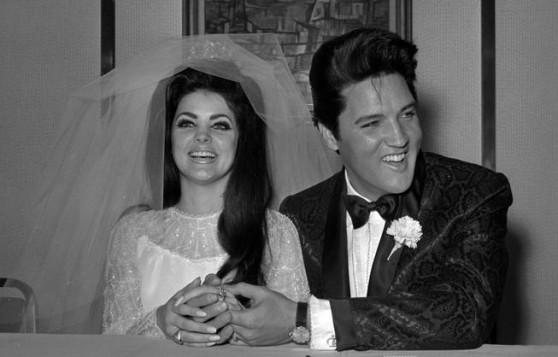Down at the End of Lonely Street: The King still has no clothes
If you only have time in your life for one Elvis Presley biography, and can’t commit to the diaristic detail of the two-volume Guralnick, you could do worse than Down at the end of Lonely Street: The Life and Death of Elvis Presley. Peter Harry Brown and Pat H. Broeske have done the work, particularly on Presley’s mid-fifties rise and early film career, and unearth a few morsels that even this Presley-bio completist hadn’t heard — like that execs considered Presley for a musical version of Li’l Abner, and that, for his wedding to Priscilla, Presley’s hair was constructed into that famous pompadour using a wire frame (you’d never guess, but then once you know, you can’t unsee it).
The writing is not great — not worse than anything else in the genre, but still not great. “Encapsulated” is used as a synonym for “imprisoned”; longtime Presley associate Marty Lacker is quoted on the subject of Gladys and Vernon Presley’s abusive arguments thusly: “‘I understand she called him every name in the book as his hand stung her face, again and again.'” Well, what I understand, after reading every other book on this subject, is that Lacker is highly unlikely to have used that Danielle-Steely a wording. Ditto Presley’s fellow recruit Rex Mansfield on the Memphis Mafia’s “forays to the fleshpots of Paris and Frankfurt” on 182. If you want us to believe what they say, we have to believe how they talk.
But Lonely Street has a larger credibility problem that’s harder to pinpoint. The story takes its sweet and detailed time with Presley’s life and career up through his return from the Army, but shortly after Priscilla enters the timeline, the prose and pacing begin to seem almost nervous, unwilling to make eye contact with certain realities — like, for example, that Priscilla herself is fourteen years old when Presley meets her, and not much older than that when she’s installed, a virtual prisoner, in Graceland. Yes, no doubt he connected with her on a mutual-shyness level. She’s still fourteen. He still refused to have intercourse with her after she gave birth to Lisa Marie. That that relationship was beyond pathological isn’t new information, and Presley surely had his reasons, but reasons aren’t excuses; Brown and Broeske are reluctant to hold Presley accountable for anything — even semi-sympathetic neuroses or addictive behaviors. They relate on pp. 408-9 that “Elvis once gave a friend a piece of paper on which he’d written down his philosophy for a happy life: Someone to love, something to look forward to and something to do.” This is key to understanding, and then still caring about, what became of Presley in the latter half of his life — the lack of structure, the boredom, the numbness of “yes” all the time. But while the authors cite the “steadily narrowing world he had created” in the next sentence, the “he had created” part seems to make them uncomfortable.
Nor do Brown and Broeske want Dr. Nick to take the fall for Presley’s drug dependency and death. In fact, they’re almost allergic to the idea that the former caused the latter, going to some lengths to prove that Presley died of cardiac arrest:
Added [Former Dade County ME Joseph] Davis: “This was a textbook case of death by heart attack.”
Why, then, have so many authors and readers wanted to believe that it was an overdose? (439)
…Because it was. Disingenuous “but that’s not what killed him killed him, like, on the day, technically” lawyering aside, Presley died because he took too many drugs. It took twenty years, one of the drugs was food, and it’s not as narratively neat (or unequivocal) as a hot shot, but that’s what happened. Lonely Street isn’t hot off the presses, but a pub date of 1997 is still recent enough to understand that the time for protecting the King is over — that we don’t love Elvis because he was a saint, but because he was messily, tackily, blazingly human.
It’s well researched and undertaken with love and respect — but perhaps too much. Colonel Parker, almost universally considered a villain in the Presley story (rightly, I think), virtually disappears from the narrative after the comeback special. It’s a fairly quick read for topic beginners, but so quick in the second half that readers with more grounding in the subject may end up wondering things like, “Wait, it’s 1966 already?” The solid (if unintentionally hilarious at times) appendix of Presley’s movies isn’t good enough to make up for the truths you’ll suspect got cut.
Tags: books Colonel Parker Down at the End of Lonely Street: The Life and Death of Elvis Presley Elvis Presley Marty Lacker Pat H. Broeske Peter Guralnick Peter Harry Brown Priscilla Presley untimely demises






Hey Sars,
Are you in a position to recommend any books that focus on Priscilla? I’m tossing up whether to read her autobiography or a biography.
Hmm. I would read “Elvis & Me” anyway; 25-30 years ago, that was almost all there was, and it’s not GREAT, but it’s sort of the yardstick, so it’s worthwhile.
The other Elvis bios focus on her to varying degrees, and there’s one that you might find interesting just because it gave a really good flavor of what life was like around Elvis and Graceland — not Priscilla-focused, necessarily, but I felt like I had a better grasp of how various things were allowed to go on. It’s an oral history by Alanna Nash, “Elvis and the Memphis Mafia.” Nash did another one called “Elvis and the Women Who Loved Him” which I have not read yet.
…Not really helpful! Sorry.